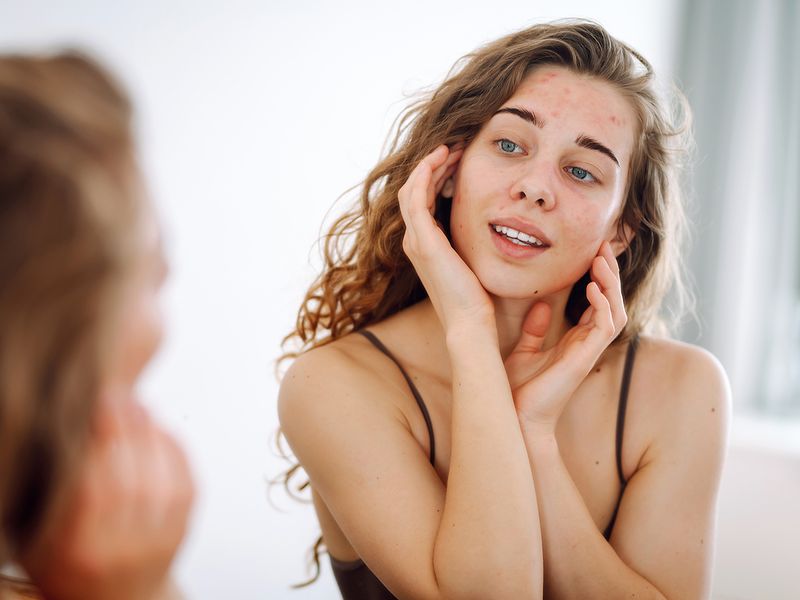Can stress give you a round face? Debunking the myths, facts behind TikTok’s cortisol face mask
Does your face get puffy and swollen after you experience stress? If so, you may be diagnosed with ‘cortisol face’, just like TikTok. A popular tagline in circulation is ‘You’re not bad. You just have a cortisol face’.
Recently, proponents have attributed the round, curvy appearance to high cortisol levels, blaming stress. Many have sworn they changed their appearance simply by ‘managing’ stress, sharing before and after photos showing their straight faces compared to ‘cortisol-induced’ faces. feelings’. The discussion doesn’t stop there: People even sell products and programs, claiming that cortisol is reduced and leads to less appearance.
“The reason you have a double chin, puffy eyes, and sagging cheeks is because your high cortisol is quietly changing the way your face looks,” said the video. another in a remarkable manner.
To quote one frustrated user who commented on one such video, “Science is not science.”
So, what exactly is cortisol, and does it really lead to a ’round face’?
What is cortisol?

Just because you’re stressed, your face doesn’t suddenly swell up like you just got sick.
Image credit: Shutterstock
Cortisol often gets a bad rap for its association with stress, but it is essential for our survival. Explaining what exactly cortisol is, Layla Shariffm, a clinical psychologist in Dubai, says, “It is a steroid hormone, produced by the adrenal glands, which are small triangular glands in the over the kidneys. It’s called the stress hormone, yet it does more than just respond to stress. It is important for the functioning of various internal organ systems, such as maintaining blood pressure, blood sugar levels, and controls the way our body uses fats and carbohydrates proteins for energy, which reduce. ”
On digital platforms, people have cited cortisol as the main cause of fatigue, dull skin and puffy face. Trying to separate the facts from the false information, Shariff emphasizes that although stress can affect our health and our skin – causing acne or eczema flare-ups – these facial effects are not immediate. . In other words, just because you are stressed, your face doesn’t immediately swell as if you just got sick. Shariff says: “It takes many years of brutal stress for such effects to manifest. As he asserts, ‘cortisol face’ is not a medical term. It should also not be confused with Cushing’s disease, which is a rare endocrine disorder.
Cushing Syndrome
According to Shahistha Joshi, an endocrinologist in Dubai, the symptoms of Cushing Syndrome are fat accumulation on the face and a symptom called ‘moon face’. These are caused by long-term exposure to cortisol, rather than short-term spikes, which most people experience when they are stressed. He explains, “Even if people are really stressed, they won’t have elevated cortisol levels as seen in those with Cushing Syndrome.”
There are many such causes of Cushing Syndrome. It can also be caused by long-term use of corticosteroid medications, such as prednisone, or it can be caused by the body itself producing excess cortisol. This excessive production can occur due to:
• A tumor in the pituitary gland (called Cushing’s disease) which indicates that the adrenal glands make more cortisol.
• Tumors of the adrenal glands that directly produce excess cortisol.
• Tumors in other parts of the body (such as the lungs) that produce a hormone called ACTH, which stimulates the production of cortisol.
As a result, there will be weight gain especially around the midsection and upper back, the ’round face’, called the ‘moon face’, the accumulation of fat between shoulders, and thin, fragile skin, accompanied by high blood pressure and muscle weakness. As Joshi adds, clinically elevated cortisol levels are different from mild elevations and need to be diagnosed with blood tests.
So what really causes a puffy face?
There can be a whole bunch of things that cause a puffy face, including water retention, illness or inflammation, explains Joshi. “Facial puffiness can be associated with problems with the lymphatic or circulatory system, illness, sinus infections, or even sleeping or sleeping for long periods of time, which can cause fluid to collect in the face,” he says. what people on TikTok are describing can be medically explained by a combination of factors, rather than simply being produced by cortisol.
There is a deep, complex relationship between stress and our health, adds Shariff. For example, the situation is this: If a person is worried, he has no energy to cook. They will order fast food, which may have high sodium levels. They didn’t sleep well either: They are still sleeping, thinking about their work and problems. A few days later, they realize that they have a proud face. The main reason for this could be lack of sleep, dehydration and excess salt in their diet.
Cortisol face: Alleviating the extremes of stress

While some may gain weight or gain weight, others may lose weight or show no visible changes at all. The effects of stress are manifested in many ways, depending on genetics, lifestyle and general health.
Image credit: Shutterstock
It’s not always easy, and the ‘face of cortisol’ is to oversimplify stress, adds Shariff. Joshi explains clearly, “Cortisol is only one hormone involved in the body’s response to stress. Other hormones, such as adrenaline and aldosterone, are also altered during stress and affect water retention, weight gain and inflammation, all of which can contribute to facial changes.”
In addition, people have different reactions when they are under stress. “While some may gain weight or gain weight, others may lose weight or show no visible changes at all. The effects of stress manifest in different ways, depending on genetics, lifestyle and overall health,” Joshi adds. For example, some people are genetically predisposed to release high levels of cortisol under stress, which can lead to excess fat storage, especially in the face and abdomen. Others may have a different hormonal response, which shows a weak effect on the body despite the same level of stress. Similarly, there are different types of metabolism, the efficiency of the lymphatic system, and even the way the body handles sodium and water retention are all influenced by genetics, which means that it is not all will have swelling or swelling.
Chronic stress and high cortisol levels can accelerate premature aging while promoting collagen breakdown, which can lead to wrinkles and sagging. High cortisol can worsen skin conditions such as acne, eczema by increasing inflammation….
– Lakshmi Saranya, clinical psychologist
Joshi explains that the way you live also affects your body. “Eat, sleep and regular exercise influence the way stress affects the body. A person who turns to comfort foods, especially sugary or salty foods, during times of stress may gain weight and experience puffiness or puffiness in the face due to water retention. Meanwhile, a person who loses their appetite or eats less when under stress may lose weight.”
Doctors explain how stress affects each person as a result of a complex combination of biology, behavior and health. Lakshmi Saranya, a clinical psychologist, explains, “Chronic stress and high cortisol levels can accelerate premature aging as it promotes the breakdown of collagen, which can lead to wrinkles and sagging. . High cortisol can worsen skin conditions such as acne, eczema by increasing inflammation.” Some people can easily see visible signs like a puffy face, while others may deal with stress internally without obvious physical changes. Understanding the complex nature of stress helps explain why not everyone has the same ‘cortisol face’ or other visible symptoms of stress. So, while you understand how stress affects the skin, it is important to take steps to reduce stress, and realize that it is not as easy as social media makes it sound.
How do you keep cortisol levels under control?

Cut back on sugary foods as they contribute to cortisol imbalances and lead to increased blood flow.
Image credit: Shutterstock
What you can do is focus on your health and well-being, explain the experts. This will include getting a good 7 to 9 hours of sleep, otherwise a good night’s sleep can lead to high cortisol levels. “You can also engage in physical activity, such as walking, swimming or cycling to help lower cortisol levels. Vigorous, prolonged exercise can sometimes raise cortisol, so try to balance,” warns Shariff.
Finally, eat a balanced, nutrient-dense diet and cut down on junk food. Focus on anti-inflammatory fruits, vegetables, whole grains, and healthy fats, such as Omega-3s from fish or flax. These help fight inflammation that stress and cortisol can cause. “Reduce sugary foods as they contribute to cortisol imbalances and lead to increased blood flow,” adds Shariff. Also, don’t forget to stay hydrated.
#stress #give #face #Debunking #myths #facts #TikToks #cortisol #face #mask
